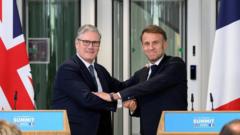Is the Club World Cup Really Fantastic? Wenger Thinks So!

Arsene Wenger Defends the Club World Cup Amid Criticism from Jurgen Klopp
In the world of football management, few figures stand as tall as Arsene Wenger. After a historic career with Arsenal, Wenger transitioned to a role at FIFA, where he now serves as the Chief of Global Football Development. In a recent discussion about the Club World Cup, Wenger found himself in the spotlight, defending the tournament against criticism from Liverpool's former manager, Jurgen Klopp. This article delves into the contrasting views surrounding the Club World Cup, the implications of Wenger's remarks, and the future of international football tournaments.
The Club World Cup: An Overview
The Club World Cup has undergone significant changes in recent years. Initially, a small-scale tournament featuring the champions of each continent, it has been expanded to include 32 teams, moving its scheduling to the summer months. This transformation aims to increase its prestige and global reach, positioning it as a crucial event on the football calendar.
However, not everyone is enamored with this shift. Jurgen Klopp's vocal criticism highlighted concerns that the tournament might detract from the already packed football calendar, deeming it "the worst idea ever invented." His remarks sparked a heated debate within the football community, bringing Wenger's supportive stance into focus.
Wenger's Response to Klopp
When confronted with Klopp's allegations, Wenger took a diplomatic approach. He acknowledged the right to differing opinions but firmly disagreed with Klopp's assessment. "I am going to give a very boring answer to a very interesting question," Wenger stated, indicating his commitment to addressing the issue with professionalism.
Wenger emphasized the positive feedback from clubs that participated in the Club World Cup, asserting, "If you make enquiries to all the clubs who were here then 100% of answers would be that they would want to do it again." This statement reflects Wenger's belief in the tournament's value and potential for growth.
The Fan Perspective
A crucial aspect of any sporting event is the fans. Wenger pointed out that fan attendance and engagement were higher than initially anticipated. "We believe the attendances were projected as low and in reality were much higher," he noted, reinforcing the notion that the Club World Cup holds appeal for supporters. This point is critical, as the success of any tournament largely depends on its ability to engage and entertain fans.
The Importance of Global Competitions
As football continues to globalize, competitions like the Club World Cup become increasingly important. They provide a platform for clubs from different continents to showcase their talents on an international stage. Wenger argued that such competitions foster a sense of unity and excitement among fans worldwide.
Moreover, the expansion of the tournament could lead to greater financial benefits for participating clubs, enhancing their competitiveness both domestically and internationally. This could be particularly crucial for clubs in regions where football is still developing.
Preparing for Future Challenges
As FIFA looks ahead to the 2026 World Cup, which will be co-hosted by the United States, Canada, and Mexico, Wenger highlighted the need for continuous improvement in tournament organization. He addressed the challenges posed by extreme weather conditions, particularly heat, which affected the players' performance during some matches.
"The heat in some games was a problem," Wenger acknowledged. He noted that FIFA has already begun implementing strategies to combat these challenges, such as introducing cooling breaks and ensuring that pitches are adequately watered during games.
Lessons Learned from Previous Tournaments
Wenger's insights into the logistics of hosting major tournaments are invaluable. He pointed out that the quality of the playing surface is crucial for player performance. "We shouldn't underestimate the quality of the permanent [real grass] pitches," he said, indicating that improvements in pitch management could lead to better outcomes in future events.
Furthermore, Wenger's comments on analyzing the impact of heat on players' performance—specifically its effect on high-speed running—demonstrate a proactive approach to addressing potential issues. Understanding how extreme conditions affect player performance can lead to better preparation and adaptation strategies.
The Future of the Club World Cup
The planned changes to the Club World Cup mark a significant evolution in international football. With the expansion to 32 teams, the tournament is set to gain traction and attract a larger audience. This development raises several questions:
- Will the increased number of teams dilute the quality of the competition?
- How will clubs manage their resources and schedules to accommodate the additional matches?
- Can FIFA successfully engage fans and ensure high attendance rates?
Wenger remains optimistic about the future of the tournament. His confidence stems from the positive feedback received from clubs and fans alike. "Certainly next year in stadiums there will also be more with roofs, and the TV times will be more sensitive," he stated, hinting at potential advancements in stadium technology and scheduling that could improve the fan experience.
Conclusion: A New Era for Global Football
As football continues to evolve, the Club World Cup stands as a testament to the changing landscape of the sport. With Arsene Wenger at the helm of global football development, there is hope for a more inclusive and engaging future for international club competitions. While Klopp's criticisms echo the concerns of many, the enthusiasm from participating clubs signifies a desire for growth and innovation in the football world.
As we look forward to the upcoming tournaments, one cannot help but wonder: how will the Club World Cup reshape the future of global football? With its expansion, will it become a beloved fixture in the football calendar, or will it struggle to find its place? The answers lie ahead as the beautiful game continues to adapt and thrive.
FAQs
What is the Club World Cup?
The Club World Cup is an international football tournament featuring the champions from each of the six continental confederations, along with the host nation's league champions. The tournament has been expanded to include 32 teams in its recent format.
Why did Jurgen Klopp criticize the Club World Cup?
Jurgen Klopp labeled the Club World Cup as "the worst idea ever invented," expressing concerns about its impact on the football calendar and the potential for player fatigue.
How does Arsene Wenger defend the Club World Cup?
Wenger defends the tournament by emphasizing the positive feedback from participating clubs and the high attendance rates from fans. He believes the tournament is necessary for global football development.
What challenges did FIFA face during previous tournaments?
FIFA faced challenges such as extreme weather conditions, affecting player performance and match logistics. Wenger highlighted the importance of addressing these issues for future tournaments.
What are the expected changes for the Club World Cup in the future?
The Club World Cup is set to expand to 32 teams, with improvements planned in stadium technology, pitch quality, and scheduling to enhance the fan experience.
As the Club World Cup continues to evolve, will it become the prestigious event that Wenger envisions, or will it face ongoing criticism? Only time will tell. #FootballFuture #ClubWorldCup #ArseneWenger
Published: 2025-07-10 22:51:27 | Category: sport



